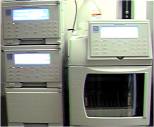





|
R&D Resources
& Capabilities
Chemistry
Biochemistry
Physical Properties
|

%20-%20small.jpg)
|
Chembiotech Laboratories utilise a variety of analytical techniques for both
routine analysis and more advanced R&D projects for clients, particularly in
areas of new product development, product quality control (QC), and product
property modification and troubleshooting. Regularly employed techniques
include:
- High Performance Liquid Chromatography (HPLC)
-
High Performance Size Exclusion Chromatography (HP-SEC)
-
Rheological analysis (creep, flow & oscillation measurements)
-
Texture analysis (adhesion, extrusion, penetration tests)
-
Fourier Transform-InfraRed (FT-IR) spectroscopy
-
Ultraviolet/visible (UV/vis) spectrophotometry
Chembiotech Laboratories also has regular access to a number of other high-power
techniques, including Gas Chromatography (GC), Mass Spectrometry (MS), GC-MS,
Nuclear Magnetic Resonance (NMR) spectroscopy, Scanning Electron Microscopy
(SEM), Energy Dispersive X-ray Analysis (EDXA), etc.
Chembiotech Laboratories also created a computer-controlled Fibre Rig
for the wet-spinning of polysaccharide-based fibres, such as those based upon
Na/Ca alginate, and Na alginate/alginic acid. Fibre properties can be
manipulated by incorporation of other biomaterials/polysaccharides into the
spinning dope solution, along with pharmaceutically 'active' additives resulting
in fibres with controlled release properties. Fibre filament dimensions/shape
can be controlled using different tantalum spinnerets, and properties also
manipulated using different draw and stretch ratios during fibre production.
Listed below are some examples of the types of analyses performed by Chembiotech
Laboratories using such equipment/techniques:
- High Performance Liquid Chromatography (HPLC)
-
-
Chembiotech Laboratories primarily utilises
a type of HPLC called High Performance Anion Exchange Chromatography
(HP-AEC) for the identification and quantification of
carbohydrates (mono- and oligo-saccharides) and amino acids.
|

|
- These can be free or monomeric components of larger biological
macromolecules (such as polysaccharides and proteins) that are liberated on
hydrolysis. Detection can be accomplished by a number of techniques, which
include pulsed amperometric detection (PAD) and
photodiode array detection. Chembiotech Laboratories
utilises Dionex equipment and CarboPac
columns for such analyses.
- High Performance Size Exclusion Chromatography
(HP-SEC)
-
- HP-SEC is utilised by Chembiotech Laboratories for the analysis of polymers
in aqueous solution (mainly polysaccharides and proteins). Detection is
performed using a differential refractive
index (DRI) detector. Using appropriate standards with low
polydispersity, the molecular size of polymers can be compared
and contrasted and software used to generate the commonly used
macromolecular size statistical
averages: M
n,
Mw,
Mz
and Mz+1.
Chembiotech Laboratories utilises Dionex equipment and
TSK columns for such analyses.
-
Rheological analysis (creep, flow & oscillation measurements)
-
-
Chembiotech Laboratories use a combination of flow, creep and oscillation
measurements
to determine and compare/contrast the viscoelastic characteristics of
raw/modified biomaterials and products.
-
Flow tests are routinely performed in order to ascertain differences in zero
shear viscosity and shear thinning, which can be related to molecular weight and
molecular weight distribution. Such techniques can provide a lot of information
with respect to the physical properties of gel materials, such as
polysaccharide-based hydrogel wound dressings, and for
comparing the gelatinisation profiles of starches of
different botanical origin.
Chembiotech laboratories utilise a TA Instruments
controlled stress rheometer equipped with a variety of different size cone and
flat plate geometries.
|
|
Texture analysis (adhesion, extrusion, penetration tests) |
-
-
Texture analysis is utilised by Chembiotech Laboratories for the comparative,
quantifiable and reproducible assessment of a number of different
material/product properties. Chembiotech Laboratories utilises a
Stable Micro Systems Texture Analyser, which is effectively a
calibrated force probe that measures the force required to perform various
activities. This is a very versatile instrument when equipped with a number of
probes and attachments for testing specific parameters or types of materials.
For example the hardness index of a wide range of materials can be determined by
penetration test using conical and finger probes. Chembiotech Laboratories have
assessed the adhesiveness and cohesiveness
of commercial polysaccharide-based hydrogel wound dressings using a cylinder
probe, and their mucoadhesion properties (using a
specilised mucoadhesion rig), and also the extrusion
properties of viscous raw material solutions and products using forward and
backward extrusion attachments.
-
-
-
Fourier Transform-InfraRed (FT-IR) spectroscopy
-
- Elucidation of chemical
functionality is routinely performed on a wide range of materials (both natural
and synthetic) by FT-IR spectroscopic analysis. Chembiotech Laboratories
utilises a Nicolet FT-IR spectrometer equipped with an Attenuated
Total Reflectance (ATR) sampling accessory, which permits direct
analysis of solid and liquid samples. This is particularly useful for analysis
of fibrous polysaccharide samples (such as chitosan and cellulose), which are
very difficult to analyse by traditional transmission sample preparation
techniques (e.g. nujol mull / KBr disc). Chembiotech Laboratories specifically
utilise FT-IR spectroscopic analysis for carbohydrate derivative
characterisation, were spectra peak height and peak area measurements can be
used to facilitate
degree of substitution
(DS) determination for selected chemical functionalities.
-
-
Ultraviolet/visible (UV/vis) spectrophotometry
-
-
Chembiotech Laboratories regularly employ the use of colorimetric/
spectrophotometric assays for the determination of specific classes of material,
such as the cysteine-sulphuric acid assay for aldohexoses, the carbazole assay
for uronic acids, the ninhydrin assay for amino groups and numerous assays for
protein content determination.-
- Chembiotech Laboratories has also been involved in the modification of
existing assays and the design of new assay chemistries for specific targeted
compounds, such as the development of a new assay based on the cysteine-sulphuric
acid assay for the detection of cellulose breakdown products, namely
2-furfuraldehyde and 5-hydroxymethylfurfural, and the development of a new assay
for the detection of nicotine metabolites in the saliva of smokers.
-
|
|





